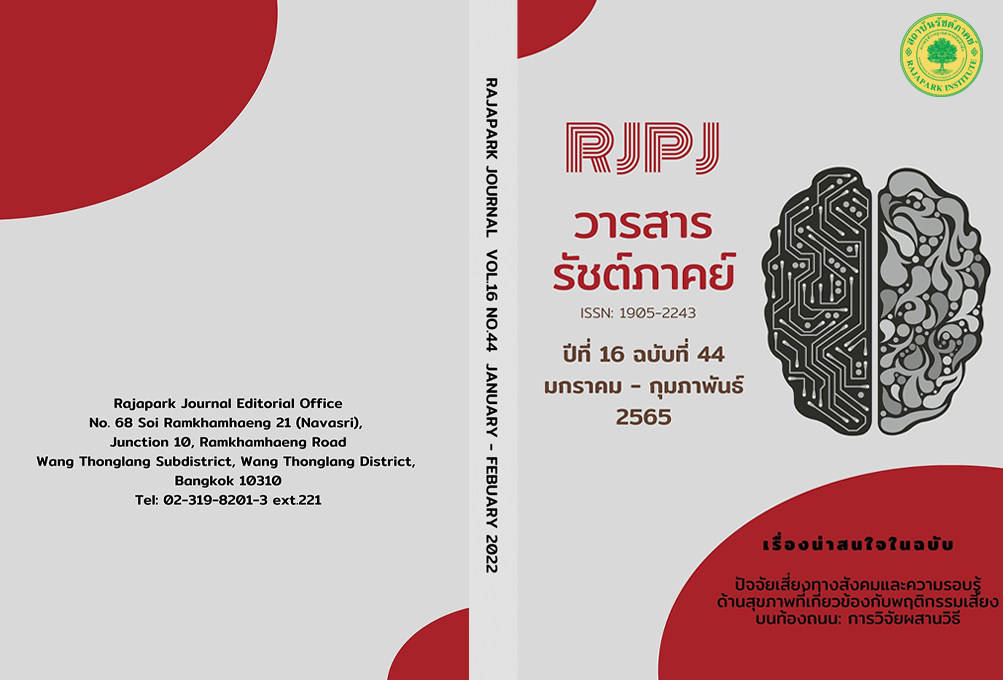Factors Analysis of Technological Leadership of School Administrators under the Secondary Educational Service Area Office Nakhon Sawan
Main Article Content
Abstract
This research aimed to study (1) to study the level of technological leadership of school administrators and (2) to analyze the factors of technological leadership of school administrators under the Secondary Educational Service Area Office Nakhon Sawan. The sample group was 400 teachers. They were selected by the multistage randomization technique. The instrument was a questionnaire. Analysis data by basic statistics and exploratory factor analysis (EFA) was calculated with the Varimax method. The research results were found as follows; 1. The level of the technological leadership of school administrators under the Secondary Educational Service Area Office Nakhon Sawan showed a high score. The variable with the highest average was the support for the use of technology in teaching and learning with responsibility and safety, followed by the legal use of technology. The variable with the lowest mean was the implementation of the school’s vision to achieve the set goals. 2. Factors of the technological leadership of school administrators were eight factors. All of the eight factors were: 1) Ethical technology leadership 2) Leadership in management innovation 3) Leadership in technological networking 4) Leadership in technology support 5) Visionary leadership 6) Leadership in organizational development towards excellence 7) Leadership in personnel development and 8) Leadership in technology integration into practice.
Article Details

This work is licensed under a Creative Commons Attribution-NonCommercial-NoDerivatives 4.0 International License.
Views and opinions appearing in the Journal it is the responsibility of the author of the article, and does not constitute the view and responsibility of the editorial team.
References
Aksornnarong, C., & Purisan, K. (2018). Factors Affecting Technology Leadership Information of School Administrators United Campus, Nong Han Under the Education Service Area Office Secondary School District 20, Udon Thani Province. College of Asian Scholar Journal, 8(2), 178-188.
Boonchan, B. (2014). The Structural Equation Model of Technological Leadership of Educational Institution Administrators(Doctor of Philosophy, Educational Administration). Khon Kaen University.
Bowen, E., Bertoline, G.R., Athinarayanan, R., Cox, R.F., Burbank, K., Buskirk, D.R., & Küçükönal, H. (2013). Global Technology Leadership: A Case for Innovative Education Praxis. Procedia-Social and Behavioral Sciences, 75(3), 163-171. DOI: 10.1016/j.sbspro.2013.04.019
Chaemchoy, S. (2015). Technology Leadership: Leading Technology into 21st Century Schools. Journal of Education Naresuan University, 17(4), 216-224.
Hair, J. F., Black, W. C., & Anderson, R. E. (2010). Multivariate Data Analysis: A Global Perspective (7th ed.). New Jersey: Pearson Education Inc.
Hurt, A. C., Deadman, R. C., Daugherty, J., & Lybrook, D. O. (2014). Pathways to Technology Leadership. In the Paper presented at the 2014 ASEE Annual Conference & Exposition, Indianapolis, Indiana. DOI: 10.18260/1-2--22906
Inrak, S. (2016). Effective Thinking Skills of School Administrators. Journal of Chandrakasemsarn, 22(43), 17-31.
Jongwisan, R. (2013). Leadership, Research Theory and Approach to Development. Bangkok: Chulalongkorn University.
Krejcie, R. V., & Morgan, D. W. (1970). Determining Sample Size for Research Activities. Educational and Psychological Measurement, 30(3), 607-610.
Malisuwan, S. (2019). Education will be Transformed in the Digital Economy Era. Retrieved from https://www.it24hrs.com/2016/digital-economy-education-ioe/
Niemsiri, C. (2018). Effective Leadership in Thailand 4.0 Era, Case Study of Khon Kaen Province. Bangkok: National Defence College of Thailand.
Nuengpanom, P. (2016). Strategies Management of Rajabhat Universities for Sustainable Local Development(Doctor of Education Management). Dhurakij Pundit University.
Office of the National Economic and Social Development Council. (2015). The Direction of National Economic and Social Development, Vol. 12. Documents for brainstorming opinions on the direction of the National Development Plan, Vol. 12. Bangkok. Office of the National Economic and Social Development Council.
Raman, A., & Thannimalai, R. (2019). Importance of Technology Leadership for Technology Integration: Gender and Professional Development Perspective. Retrieved from https://doi.org/10.1177/2158244019893707
Rattanasiraprapha, N. (2014). The School Administrators’ Competencies Affecting the World-Class Standard Schools’ Characteristics Under Office of The Basic Education Commission. Veridian E-Journal, Silpakorn University, 7(3), 507-528.
Sida, W. (2018). The Relationship Between Transformational Leadership and Personnel Management of School Administrators under the Office of Sakon Nakhon Primary Educational Service Area 3(Master’s Thesis). Sakon Nakhon Rajabhat University.
Somjai, S., & Kijthorntham, W. (2018). School Administration by Technology Leadership. Dusit Thani College Journal, 12(1), 350-363.
Soontorn, A. (2010). Factor Analysis of the Desired Characteristics of Thesis Advisors at Naresuan University(Independent Study). Naresuan University.
The Secondary Education Service Area Office Nakhon Sawan. (2020). Action Plan of the Fiscal Year B.E. 2563(2020). Nakhon Sawan. The Secondary Education Service Area Office Nakhon Sawan.
Thitikornprapapong, K., & Boonmepipit, P. (2015). The Information Technology Management Affecting to Internet Using the Learning Processes of Teachers in School under Phetchaburi Primary Educational Service Area Office 2. Veridian E-Journal, Silpakorn University, 8(3), 1-13.
Vanichavasin, P. (2017). Leadership Development: Theories, Best Practice and Case Study. Bangkok: Panyachon.
Watcharaatayaphon, R. (2020). Indicators of Technological Executives in Schools Under the Bangkok Metropolitan Administration(Doctor of Education). Mahamakut Buddhist University.
Wongwilai, S., Ratana-o-larn, T., & Kiddee, K. (2015). Factor Analysis of Knowledge Management Process of Autonomous University. Veridian E-Journal, Silpakorn University, 8(3), 811-829.
Yafu, S. (2017). Educational Research. Nakhon Sawan: Nakhon Sawan Rajabhat University.


